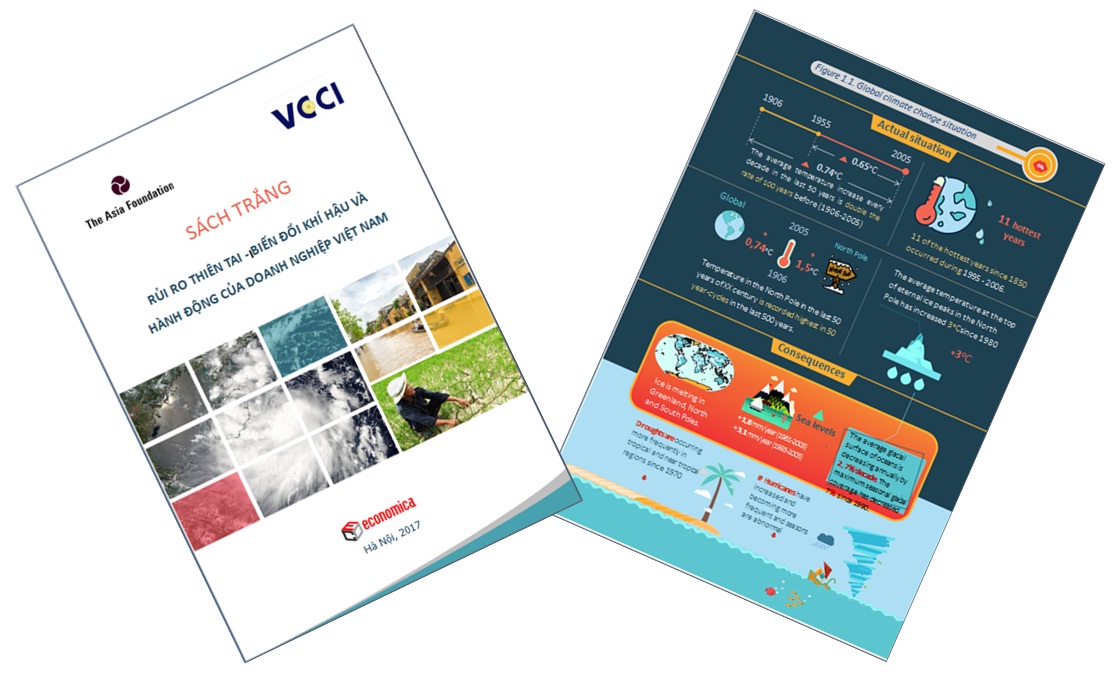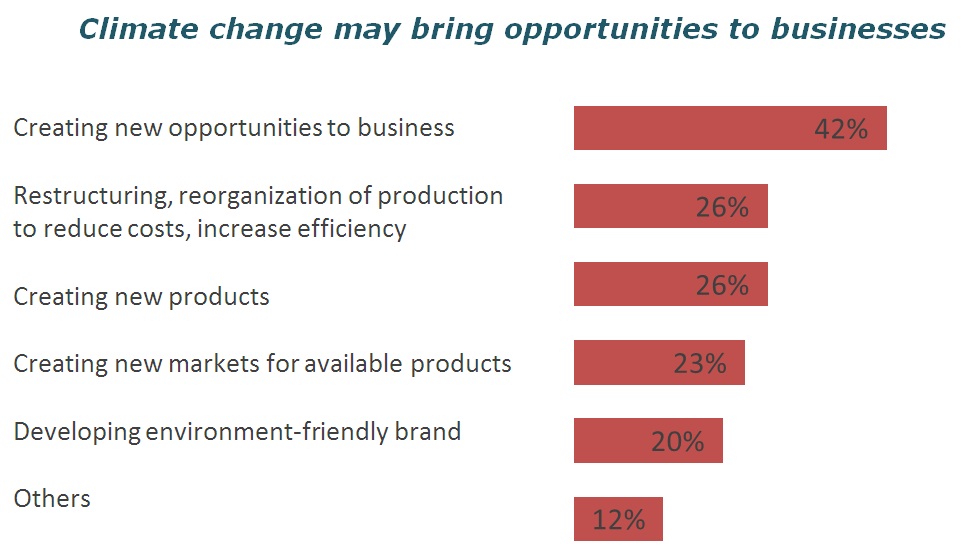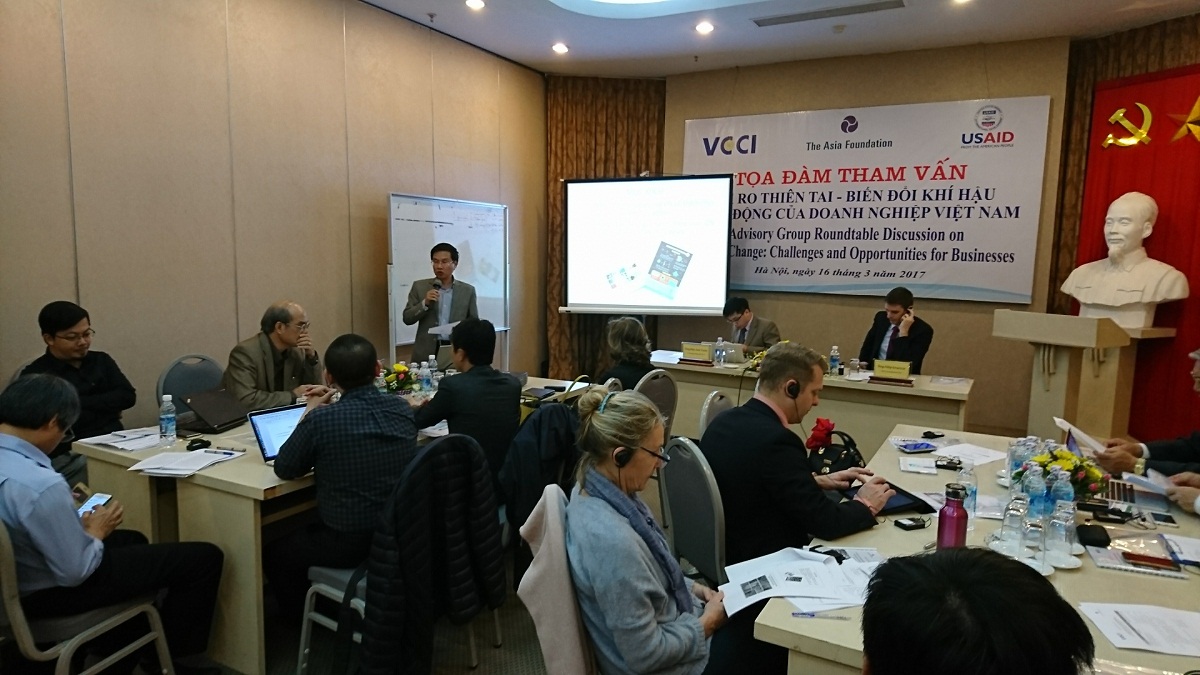
[27 Mar. 2017] – Business played a
critical role in making the country more resilient to climate change. In an
effort to raise the awareness of the business sector and enterprises in Vietnam
to step up actions and measures in response to risks and opportunities related
to climate change, a White Paper on Natural Disaster Risks, Climate Change and
Responses by Vietnamese Business has been composed by Economica Vietnam under
the cooperation between Vietnam Chamber of Commerce and Industry (VCCI) and The
Asia Foundation (TAF).

In
2016 alone, extreme weathers caused great losses to Vietnam with the historic cold waves in 14 northern
provinces, droughts and salty intrusion in provinces in central and Mekong
delta areas, late raining and historic floods in central regions. According to the Central Committee for Flood
and Storm Control, as a result of natural disaster and climate change, 1
million people do not have access to clean water for daily lives, and 300,000
hectares of rice is lost from 30-80% of productivity, and hundreds of peoples
have died with the total value of economic damage of 37,650 billion VND
(equivalent to 1.7 billion USD).

The white paper discusses multiple case studies and models of climate change adaptation of Vietnamese businesses including energy saving and emission reduction of manufacturing enterprises. For example, Ha Tien Cement Plant uses energy discharged from its production line for electricity generating. Aquaculture businesses change production modalities to adapt to drought and increase level of salinity. Many businesses in the Central Highland are shifting to advanced watering system for saving water to cope with droughts and saline intrusion.
Higher temperature is detrimental to crops. However, some regions of Vietnam now become more suitable for raising animal such as sheep and goat with higher value and income that plant cultivation. Sheep raising in Ninh Thuan and Khanh Hoa now account for over 98% of the province’s production output. Forestry enterprises increase the provision of forestry environment services in which from 2011 – 2016 the enterprises and participating households has got an income of VND 4549.6 billion.
The manufacturing
businesses can seize the opportunity of a change of the global supply chain
caused by climate change. Development of renewable energy is one of the
priorities to tackle the energy challenge. Vietnam enterprises have the
opportunity to be able to participate in the development of wind power
projects. The White Paper tells the story “ Business opportunities for
Vietnamese businesses to engage in the global supply chain of General Electric
(GE)’s wind power development program in Vietnam”. Construction material
producing businesses also can seize opportunities to save energy in the
production of construction materials as the model of non-burn brick production
which help to reduce CO2 emission and waste treatment.

The banking, finance and insurance sectors has been developing new products to help community to transfer and share risks of disaster and climate change. The white paper shares the story “Quang Nam - The whole village buy insurance policies for cattle”.
The white paper calls for actions and measures by the business sector to adapt to the challenges and to seize opportunities of climate change. The paper also makes some recommendation on policy to the Government and other stakeholders for reinforcing the efforts of businesses.
 Pre-feasibility Assessment of Enabling Environment for SME in Sri Lanka (06/02/2017)
Pre-feasibility Assessment of Enabling Environment for SME in Sri Lanka (06/02/2017)
 Forum “Equitization and Economic Growth in Vietnam” (16/01/2017)
Forum “Equitization and Economic Growth in Vietnam” (16/01/2017)
 Study tour for a Nepalese delegation to learn about the foodtwear sector in Vietnam (16/12/2016)
Study tour for a Nepalese delegation to learn about the foodtwear sector in Vietnam (16/12/2016)
 Support to the Ministry of Justice in Revising the Compliance Cost Model (09/10/2016)
Support to the Ministry of Justice in Revising the Compliance Cost Model (09/10/2016)
 Implementing Regulatory Impact Assessment (RIA) for the first-ever SME Law in Vietnam (16/07/2016)
Implementing Regulatory Impact Assessment (RIA) for the first-ever SME Law in Vietnam (16/07/2016)
 Assisting Business Associations for Better Service Provision and Sustainable Development (14/05/2016)
Assisting Business Associations for Better Service Provision and Sustainable Development (14/05/2016)
 Study on Disaster Risk Finance in Vietnam – Initial Phase Completed (24/02/2016)
Study on Disaster Risk Finance in Vietnam – Initial Phase Completed (24/02/2016)
 Ba Ria-Vung Tau: Bringing Provincial Competitiveness Index back among the Top Provinces (09/01/2016)
Ba Ria-Vung Tau: Bringing Provincial Competitiveness Index back among the Top Provinces (09/01/2016)
 Benchmarking and Mapping Business Registration Processes in selected ASEAN Member States (AMSs) (30/11/2015)
Benchmarking and Mapping Business Registration Processes in selected ASEAN Member States (AMSs) (30/11/2015)
 Improving Information Portals to Enhance Provincial Business Environment (30/08/2015)
Improving Information Portals to Enhance Provincial Business Environment (30/08/2015)